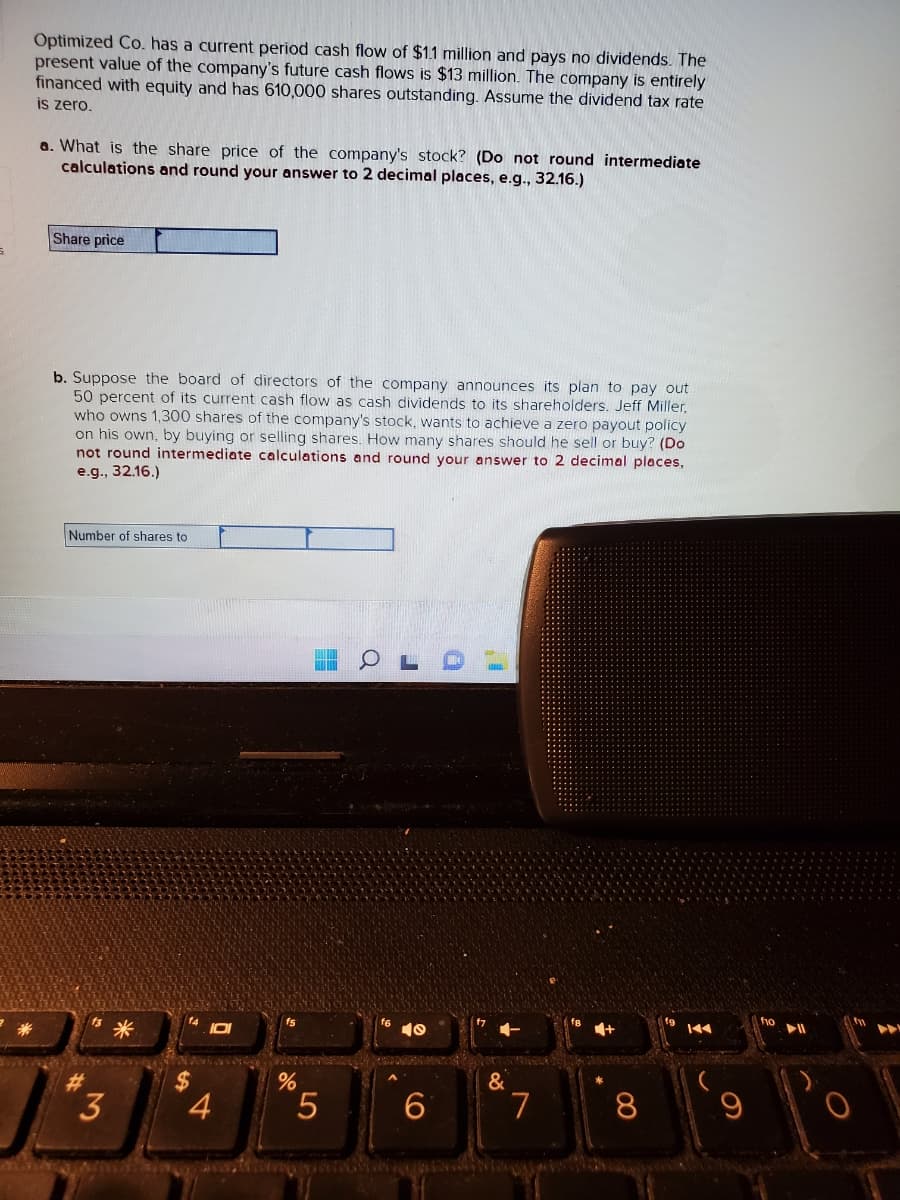d period cash flow of $1.1 million and pays no dividends. The present value of the company's future cash flows is $13 million. The company is entirely financed with equity and has 610,000 shares outstanding. Assume the dividend tax rate is zero. a. What is the share price of the company's stock? (Do not round intermediate calculations and round your answer to 2 decimal places, e.g., 32.16.) Share price
d period cash flow of $1.1 million and pays no dividends. The present value of the company's future cash flows is $13 million. The company is entirely financed with equity and has 610,000 shares outstanding. Assume the dividend tax rate is zero. a. What is the share price of the company's stock? (Do not round intermediate calculations and round your answer to 2 decimal places, e.g., 32.16.) Share price
Chapter15: Dividend Policy
Section: Chapter Questions
Problem 13P
Related questions
Question
100%

Transcribed Image Text:Optimized Co. has a current period cash flow of $1.1 million and pays no dividends. The
present value of the company's future cash flows is $13 million. The company is entirely
financed with equity and has 610,000 shares outstanding. Assume the dividend tax rate
is zero.
a. What is the share price of the company's stock? (Do not round intermediate
calculations and round your answer to 2 decimal places, e.g., 32.16.)
Share price
b. Suppose the board of directors of the company announces its plan to pay out
50 percent of its current cash flow as cash dividends to its shareholders. Jeff Miller,
who owns 1,300 shares of the company's stock, wants to achieve a zero payout policy
on his own, by buying or selling shares. How many shares should he sell or buy? (Do
not round intermediate calculations and round your answer to 2 decimal places,
e.g., 32.16.)
Number of shares to
#
3
*
4
O
werd
%
5
a
J
10
6
&
7
8
K◄◄
Expert Solution
This question has been solved!
Explore an expertly crafted, step-by-step solution for a thorough understanding of key concepts.
This is a popular solution!
Trending now
This is a popular solution!
Step by step
Solved in 2 steps

Knowledge Booster
Learn more about
Need a deep-dive on the concept behind this application? Look no further. Learn more about this topic, finance and related others by exploring similar questions and additional content below.Recommended textbooks for you

EBK CONTEMPORARY FINANCIAL MANAGEMENT
Finance
ISBN:
9781337514835
Author:
MOYER
Publisher:
CENGAGE LEARNING - CONSIGNMENT


Managerial Accounting: The Cornerstone of Busines…
Accounting
ISBN:
9781337115773
Author:
Maryanne M. Mowen, Don R. Hansen, Dan L. Heitger
Publisher:
Cengage Learning

EBK CONTEMPORARY FINANCIAL MANAGEMENT
Finance
ISBN:
9781337514835
Author:
MOYER
Publisher:
CENGAGE LEARNING - CONSIGNMENT


Managerial Accounting: The Cornerstone of Busines…
Accounting
ISBN:
9781337115773
Author:
Maryanne M. Mowen, Don R. Hansen, Dan L. Heitger
Publisher:
Cengage Learning

Intermediate Financial Management (MindTap Course…
Finance
ISBN:
9781337395083
Author:
Eugene F. Brigham, Phillip R. Daves
Publisher:
Cengage Learning


Cornerstones of Financial Accounting
Accounting
ISBN:
9781337690881
Author:
Jay Rich, Jeff Jones
Publisher:
Cengage Learning